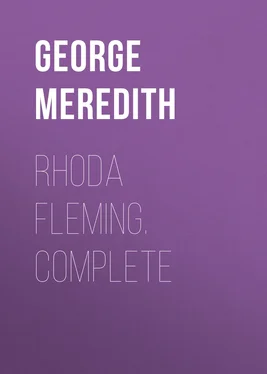George Meredith - Rhoda Fleming. Complete
Здесь есть возможность читать онлайн «George Meredith - Rhoda Fleming. Complete» — ознакомительный отрывок электронной книги совершенно бесплатно, а после прочтения отрывка купить полную версию. В некоторых случаях можно слушать аудио, скачать через торрент в формате fb2 и присутствует краткое содержание. Жанр: foreign_prose, literature_19, foreign_antique, на английском языке. Описание произведения, (предисловие) а так же отзывы посетителей доступны на портале библиотеки ЛибКат.
- Название:Rhoda Fleming. Complete
- Автор:
- Жанр:
- Год:неизвестен
- ISBN:нет данных
- Рейтинг книги:3 / 5. Голосов: 1
-
Избранное:Добавить в избранное
- Отзывы:
-
Ваша оценка:
- 60
- 1
- 2
- 3
- 4
- 5
Rhoda Fleming. Complete: краткое содержание, описание и аннотация
Предлагаем к чтению аннотацию, описание, краткое содержание или предисловие (зависит от того, что написал сам автор книги «Rhoda Fleming. Complete»). Если вы не нашли необходимую информацию о книге — напишите в комментариях, мы постараемся отыскать её.
Rhoda Fleming. Complete — читать онлайн ознакомительный отрывок
Ниже представлен текст книги, разбитый по страницам. Система сохранения места последней прочитанной страницы, позволяет с удобством читать онлайн бесплатно книгу «Rhoda Fleming. Complete», без необходимости каждый раз заново искать на чём Вы остановились. Поставьте закладку, и сможете в любой момент перейти на страницу, на которой закончили чтение.
Интервал:
Закладка:
“There!” Mrs. Lovell gave Algernon another smile. “You have to bear the sins of your rector, as well as your own. Can you support it?”
The flimsy fine dialogue was a little above Algernon’s level in the society of ladies; but he muttered, bowing, that he would endeavour to support it, with Mrs. Lovell’s help, and this did well enough; after which, the slight strain on the intellects of the assemblage relaxed, and ordinary topics were discussed. The carriages came round to the door; gloves, parasols, and scent-bottles were securely grasped; whereupon the squire, standing bare-headed on the steps, insisted upon seeing the party of the opposition off first, and waited to hand Mrs. Lovell into her carriage, an ironic gallantry accepted by the lady with serenity befitting the sacred hour.
“Ah! my pencil, to mark the text for you, squire,” she said, taking her seat; and Algernon turned back at her bidding, to get a pencil; and she, presenting a most harmonious aspect in the lovely landscape, reclined in the carriage as if, like the sweet summer air, she too were quieted by those holy bells, while the squire stood, fuming, bareheaded, and with boiling blood, just within the bounds of decorum on the steps. She was more than his match.
She was more than a match for most; and it was not a secret. Algernon knew it as well as Edward, or any one. She was a terror to the soul of the youth, and an attraction. Her smile was the richest flattery he could feel; the richer, perhaps, from his feeling it to be a thing impossible to fix. He had heard tales of her; he remembered Edward’s warning; but he was very humbly sitting with her now, and very happy.
“I’m in for it,” he said to his fair companion; “no cheque for me next quarter, and no chance of an increase. He’ll tell me I’ve got a salary. A salary! Good Lord! what a man comes to! I’ve done for myself with the squire for a year.”
“You must think whether you have compensation,” said the lady, and he received it in a cousinly squeeze of his hand.
He was about to raise the lank white hand to his lips.
“Ah!” she said, “there would be no compensation to me, if that were seen;” and her dainty hand was withdrawn. “Now, tell me,” she changed her tone. “How do the loves prosper?”
Algernon begged her not to call them ‘loves.’ She nodded and smiled.
“Your artistic admirations,” she observed. “I am to see her in church, am I not? Only, my dear Algy, don’t go too far. Rustic beauties are as dangerous as Court Princesses. Where was it you saw her first?”
“At the Bank,” said Algernon.
“Really! at the Bank! So your time there is not absolutely wasted. What brought her to London, I wonder?”
“Well, she has an old uncle, a queer old fellow, and he’s a sort of porter—money porter—in the Bank, awfully honest, or he might half break it some fine day, if he chose to cut and run. She’s got a sister, prettier than this girl, the fellows say; I’ve never seen her. I expect I’ve seen a portrait of her, though.”
“Ah!” Mrs. Lovell musically drew him on. “Was she dark, too?”
“No, she’s fair. At least, she is in her portrait.”
“Brown hair; hazel eyes?”
“Oh—oh! You guess, do you?”
“I guess nothing, though it seems profitable. That Yankee betting man ‘guesses,’ and what heaps of money he makes by it!”
“I wish I did,” Algernon sighed. “All my guessing and reckoning goes wrong. I’m safe for next Spring, that’s one comfort. I shall make twenty thousand next Spring.”
“On Templemore?”
“That’s the horse. I’ve got a little on Tenpenny Nail as well. But I’m quite safe on Templemore; unless the Evil Principle comes into the field.”
“Is he so sure to be against you, if he does appear?” said Mrs. Lovell.
“Certain!” ejaculated Algernon, in honest indignation.
“Well, Algy, I don’t like to have him on my side. Perhaps I will take a share in your luck, to make it—? to make it?”—She played prettily as a mistress teasing her lap-dog to jump for a morsel; adding: “Oh! Algy, you are not a Frenchman. To make it divine, sir! you have missed your chance.”
“There’s one chance I shouldn’t like to miss,” said the youth.
“Then, do not mention it,” she counselled him. “And, seriously, I will take a part of your risk. I fear I am lucky, which is ruinous. We will settle that, by-and-by. Do you know, Algy, the most expensive position in the world is a widow’s.”
“You needn’t be one very long,” growled he.
“I’m so wretchedly fastidious, don’t you see? And it’s best not to sigh when we’re talking of business, if you’ll take me for a guide. So, the old man brought this pretty rustic Miss Rhoda to the Bank?”
“Once,” said Algernon. “Just as he did with her sister. He’s proud of his nieces; shows them and then hides them. The fellows at the Bank never saw her again.”
“Her name is—?”
“Dahlia.”
“Ah, yes!—Dahlia. Extremely pretty. There are brown dahlias—dahlias of all colours. And the portrait of this fair creature hangs up in your chambers in town?”
“Don’t call them my chambers,” Algernon protested.
“Your cousin’s, if you like. Probably Edward happened to be at the Bank when fair Dahlia paid her visit. Once seems to have been enough for both of you.”
Algernon was unread in the hearts of women, and imagined that Edward’s defection from Mrs. Lovell’s sway had deprived him of the lady’s sympathy and interest in his fortunes.
“Poor old Ned’s in some scrape, I think,” he said.
“Where is he?” the lady asked, languidly.
“Paris.”
“Paris? How very odd! And out of the season, in this hot weather. It’s enough to lead me to dream that he has gone over—one cannot realize why.”
“Upon my honour!” Algernon thumped on his knee; “by jingo!” he adopted a less compromising interjection; “Ned’s fool enough. My idea is, he’s gone and got married.”
Mrs. Lovell was lying back with the neglectful grace of incontestable beauty; not a line to wrinkle her smooth soft features. For one sharp instant her face was all edged and puckered, like the face of a fair witch. She sat upright.
“Married! But how can that be when we none of us have heard a word of it?”
“I daresay you haven’t,” said Algernon; “and not likely to. Ned’s the closest fellow of my acquaintance. He hasn’t taken me into his confidence, you maybe sure; he knows I’m too leaky. There’s no bore like a secret! I’ve come to my conclusion in this affair by putting together a lot of little incidents and adding them up. First, I believe he was at the Bank when that fair girl was seen there. Secondly, from the description the fellows give of her, I should take her to be the original of the portrait. Next, I know that Rhoda has a fair sister who has run for it. And last, Rhoda has had a letter from her sister, to say she’s away to the Continent and is married. Ned’s in Paris. Those are my facts, and I give you my reckoning of them.”
Mrs. Lovell gazed at Algernon for one long meditative moment.
“Impossible,” she exclaimed. “Edward has more brains than heart.” And now the lady’s face was scarlet. “How did this Rhoda, with her absurd name, think of meeting you to tell you such stuff? Indeed, there’s a simplicity in some of these young women—” She said the remainder to herself.
“She’s really very innocent and good,” Algernon defended Rhoda, “she is. There isn’t a particle of nonsense in her. I first met her in town, as I stated, at the Bank; just on the steps, and we remembered I had called a cab for her a little before; and I met her again by accident yesterday.”
Читать дальшеИнтервал:
Закладка:
Похожие книги на «Rhoda Fleming. Complete»
Представляем Вашему вниманию похожие книги на «Rhoda Fleming. Complete» списком для выбора. Мы отобрали схожую по названию и смыслу литературу в надежде предоставить читателям больше вариантов отыскать новые, интересные, ещё непрочитанные произведения.
Обсуждение, отзывы о книге «Rhoda Fleming. Complete» и просто собственные мнения читателей. Оставьте ваши комментарии, напишите, что Вы думаете о произведении, его смысле или главных героях. Укажите что конкретно понравилось, а что нет, и почему Вы так считаете.












